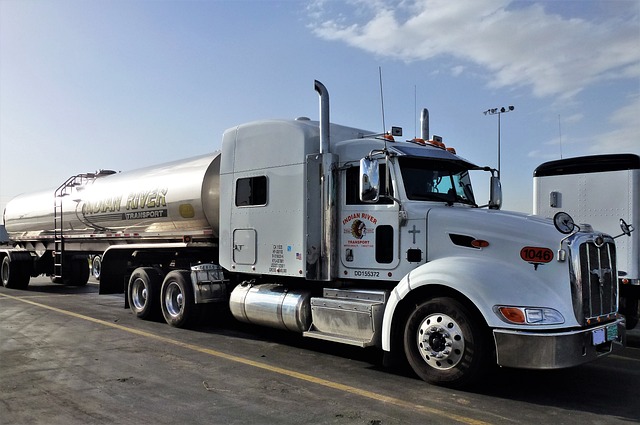In cold climates, standard lead-acid truck batteries can underperform due to the impact of freezing temperatures on their electrolyte's viscosity, which hampers chemical reactions and reduces voltage. To address this, truck owners should opt for specialized AGM or EFB truck batteries designed for low-temperature environments. These batteries have a higher paste-to-acid ratio and advanced antifreeze solutions that maintain electrolyte fluidity, ensuring consistent performance even in below-freezing conditions. Regular maintenance, including cleaning battery terminals to prevent corrosion, maintaining secure connections, keeping the battery compartment clean and dry, and using a smart charger with enhanced floating voltage tailored for cold temperatures are crucial for preserving battery health and reliability during winter. Additionally, insulating the battery with a specialized cover, parking in a heated garage, or using an engine block heater can further protect against freezing and ensure that truck batteries continue to start engines and power essential systems reliably throughout the season. AGM batteries are particularly recommended for their superior longevity and resistance to extreme cold compared to traditional lead-acid batteries. Regular inspections and servicing of the charging system are also vital during winter months to prevent downtime and extend battery life.
When winter’s chill sets in, maintaining optimal truck battery performance becomes a critical task for fleet managers and drivers alike. This article delves into the science behind how cold weather affects your truck’s battery, highlighting the best charging practices to keep it operational. From understanding the challenges that batteries face during subzero temperatures to comparing top-performing battery types designed for heavy-duty vehicles, discover essential maintenance tips to ensure your truck’s battery remains reliable throughout the frosty season. Navigate through the sections to master the art of cold-weather truck battery care and safeguard against unexpected downtime due to power issues.
- Understanding Truck Battery Performance in Cold Conditions
- Assessing the Impact of Low Temperatures on Truck Batteries
- Top Charging Techniques to Maintain Truck Battery Health During Winter
- Comparing Cold-Weather Battery Types for Heavy-Duty Vehicles
- Essential Maintenance Tips to Ensure Truck Battery Reliability in Freezing Climates
Understanding Truck Battery Performance in Cold Conditions

When temperatures plummet, the performance of a truck battery can be significantly affected. In cold weather conditions, the chemical reactions within a lead-acid battery, which is a common type used in trucks, slow down due to reduced electrical conductivity in the electrolyte solution. This results in less efficient energy release, making it harder for the battery to start the engine. The viscosity of the electrolyte increases, causing a decrease in ion mobility and a rise in internal resistance, leading to a drop in cold cranking amps (CCA), which measure the battery’s ability to deliver current at sub-zero temperatures. To mitigate these issues, it’s advisable to opt for batteries specifically designed for cold weather environments. These AGM (Absorbent Glass Mat) or EFB (Enhanced Flooded Battery) models offer superior performance in low temperatures due to their construction and valve regulation technology that prevents overcharging. Regular maintenance, such as keeping the battery clean, ensuring a proper charge, and inspecting the terminals for corrosion, can also help maintain optimal battery function during the winter months. Truck owners operating in regions with harsh winters should consider these factors to ensure their vehicles’ batteries remain reliable and capable of enduring the cold.
Assessing the Impact of Low Temperatures on Truck Batteries

When operating in cold weather environments, truck batteries face significant challenges due to the impact of low temperatures on their performance. The chemical reactions within a lead-acid battery, which are the most common type used in trucks, can slow down or even cease when exposed to freezing conditions. This reduction in performance is primarily due to the thickening of the battery’s sulfuric acid electrolyte, which slows down the critical reactions that normally provide electrical power. The viscosity of the electrolyte increases, making it harder for ions to move and produce the necessary voltage. As a result, truck drivers and fleet operators must be vigilant in selecting batteries capable of withstanding harsh winter temperatures. Truck batteries specifically designed for cold weather have a higher ratio of paste to acid, which helps them maintain optimal performance in freezing conditions. These enhanced batteries often come with specialized features such as improved antifreeze formulations, ensuring that the electrolyte remains fluid enough to function correctly even when external temperatures plummet. It’s crucial for truck owners and operators to consider these factors to ensure their vehicles remain operational in cold weather, avoiding the inconvenience of battery failure and the downtime associated with it. Regular maintenance and inspection can also help mitigate the effects of low temperatures on truck batteries, ensuring they provide reliable power when needed most.
Top Charging Techniques to Maintain Truck Battery Health During Winter

When winter’s chill sets in, truck batteries face unique challenges that can impair their performance and longevity. To maintain battery health during these cold months, it’s crucial to adopt specific charging techniques. Optimal charging conditions for a truck battery are between 20°F and 77°F (-6°C to 25°C); extreme temperatures below this range can affect the battery’s capacity and ability to hold a charge. Regularly charging your truck battery to a full state of charge can prevent sulfation, a condition where sulfuric acid in the battery becomes less soluble, reducing its efficiency. Additionally, using a smart charger designed for cold weather climates is beneficial. These intelligent devices monitor battery health and temperature, providing only the necessary power to keep the battery fully charged without overcharging or discharging it, which can be more damaging than overcharging at standard temperatures.
Furthermore, consider insulating your truck battery with a suitable cover that traps heat and protects against the cold. Insulation is key in preventing the battery’s fluids from freezing and ensuring optimal performance. It’s also wise to park your vehicle in a heated garage or use an engine block heater when possible, especially if you’re operating in areas where sub-zero temperatures are common. Regularly inspecting and cleaning battery terminals is another preventative measure, as corrosion can impede the connection and lead to reduced performance. By implementing these charging techniques and proactive maintenance strategies, you can safeguard your truck battery from the harsh effects of winter and ensure it remains reliable and ready for use throughout the season.
Comparing Cold-Weather Battery Types for Heavy-Duty Vehicles

When operating in cold weather conditions, heavy-duty vehicles such as trucks face unique challenges that can affect their performance and reliability. The battery, a critical component, must withstand freezing temperatures to ensure consistent starting and power supply for onboard systems. Among the best charging options for cold weather, truck batteries designed with absorbed glass mat (AGM) technology stand out due to their durability and resistance to extreme temperatures. AGM batteries are sealed, spill-proof, and have a longer lifespan compared to traditional lead-acid batteries. Their ability to maintain a charge in subzero environments makes them ideal for heavy-duty use in cold climates.
Another robust option for truck batteries in harsh weather is the enhanced flooded battery (EFB). While similar to conventional flooded batteries, EFBs are optimized with specialized additives in the electrolyte that enable better performance at low temperatures. This enhances the battery’s ability to crank the engine even when the mercury dips. For heavy-duty trucks that frequently operate in cold environments, the choice between AGM and EFB batteries often comes down to factors such as the vehicle’s specific use case, the frequency of short trips (which can lead to partial state of charge issues), and the budget for maintenance and replacement. Both types offer reliable cold-weather performance, but AGM batteries generally provide a wider range of benefits in terms of longevity and overall reliability under extreme temperatures.
Essential Maintenance Tips to Ensure Truck Battery Reliability in Freezing Climates

In cold weather conditions, maintaining your truck battery’s reliability becomes paramount to ensure consistent performance and avoid unexpected downtime. Cold temperatures can significantly reduce a lead-acid battery’s capacity and increase its likelihood of failure. To mitigate these effects, regularly clean the battery terminals, removing any corrosion or buildup that could impede conductivity. Ensure the connections are tight to prevent any loss of charge due to poor contact. Keeping the battery compartment clean and dry will also help maintain optimal charging conditions.
Beyond cleaning and inspection, selecting the appropriate charging system tailored for cold climates is crucial. Opt for a charger with an enhanced floating voltage that accommodates the lower operational temperatures without overcharging or damaging the battery. Additionally, employing a smart charger with temperature compensation can dynamically adjust charging parameters to maintain peak battery health in low-temperature environments. Regularly check your truck’s charging system, especially during winter months, and address any issues promptly to prevent cold weather from compromising your truck battery’s performance and longevity.
When navigating the challenges of cold weather, maintaining optimal truck battery performance is paramount. This article has delved into the intricacies of how low temperatures affect heavy-duty vehicle batteries, emphasizing the importance of adopting effective charging strategies and selecting appropriate battery types for the winter season. By implementing the top charging techniques outlined, along with the essential maintenance tips provided, truck owners can safeguard their vehicles’ battery health during the frosty months. In conclusion, understanding and addressing the specific needs of truck batteries in cold conditions is not just about staying ahead—it’s an essential step for ensuring consistent performance and reliability throughout the year, regardless of the weather.



